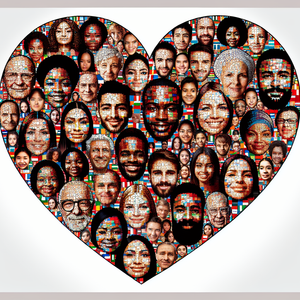The Rise of Virtual Life Coaching Communities

As life coaching gains popularity, various online platforms have sprung up, designed specifically to connect coaches with clients. Websites and applications like BetterHelp, CoachAccountable, and even social media groups provide spaces where individuals seeking guidance can easily find and connect with qualified life coaches. This accessibility has significantly democratized life coaching, allowing people from diverse backgrounds and locations to access professional support. For instance, platforms like Meetup and Facebook Groups have facilitated the creation of communities where life coaches can share insights, collaborate, and learn from one another. These spaces not only help coaches refine their skills but also create an environment where they can support each other through challenges, share resources, and celebrate successes. As the demand for remote services grows, these platforms become increasingly important for both coaches and clients alike.
Success Stories from Virtual Communities
The success stories emerging from these virtual life coaching communities are both inspiring and illustrative of the power of connection. One notable example is a life coach who faced initial struggles in building her practice. After joining a dedicated online community, she began to share her experiences and learn from others, which led her to refine her coaching techniques and marketing strategies. Within months, she transformed her practice, gaining clients from around the globe. Another story features a group of life coaches who pooled their resources and knowledge to launch a joint online workshop. By collaborating, they not only expanded their reach but also enriched their offerings, creating a comprehensive program that addressed various personal development needs. This collaborative spirit is a hallmark of virtual communities, where sharing knowledge and resources can lead to exponential growth. Success stories such as these are increasingly common, demonstrating the tangible benefits of being part of a supportive network.
Benefits of Community Support
One of the most significant advantages of virtual life coaching communities is the sense of belonging they foster. Coaches often experience isolation, especially if they work from home. Engaging with a community can alleviate feelings of loneliness and provide valuable emotional support. Within these networks, coaches can discuss their challenges, celebrate their victories, and seek advice on difficult situations. Moreover, community support extends beyond emotional well-being. Many coaches benefit from peer feedback on their methods and strategies. Constructive criticism from fellow coaches can lead to improved practices and more effective client interactions. This collaborative feedback loop enhances the overall quality of coaching offered within these communities. Such environments can also serve as incubators for innovative ideas, where coaches can experiment with new techniques and share their outcomes, thereby contributing to collective growth.
Adapting to a Remote Environment
As life coaching continues to evolve, coaches must adapt to the unique dynamics of remote environments. Virtual communities provide a platform for sharing best practices on maintaining client engagement during online sessions. Techniques such as interactive tools, gamification, and personalized follow-ups can make virtual coaching more effective and enjoyable. Additionally, these communities often share insights on leveraging technology to enhance service delivery. From video conferencing tools to online scheduling systems, coaches can better manage their practices and provide seamless experiences for clients. As the industry moves forward, staying updated on technological trends will be vital, and virtual communities serve as excellent resources for this purpose. The adaptability of life coaches is crucial in maintaining effectiveness in virtual settings, and communities provide a space for sharing successful approaches. For example, a coach might find success with a particular app for tracking client progress, thereby equipping others in the community with valuable tools for their own practices.
The rise of virtual life coaching communities illustrates the power of connection in the digital age. By providing platforms for coaches and clients to interact, these communities are reshaping the landscape of life coaching. They foster collaboration, emotional support, and shared learning, ultimately enhancing the quality of coaching services available. As more individuals turn to life coaching for guidance, embracing these virtual networks can empower coaches to thrive in their practices, creating a profound impact on the lives of their clients. In a world that often feels disconnected, these communities serve as vital lifelines, proving that even in a virtual space, meaningful connections can flourish. As the trend continues, it is clear that the future of life coaching lies in the strength of these digital communities, where coaches can find not just clients, but a supportive network to help them navigate their professional journeys.
Virtual Life Coach
BetterHelp, Noom
Core Responsibilities
Conduct personalized coaching sessions via video conferencing platforms to support clients in achieving their goals.
Develop tailored coaching plans and strategies based on individual client needs and backgrounds.
Utilize digital tools to track client progress and facilitate engagement between sessions.
Required Skills
Strong communication and active listening skills to foster client trust and understanding.
Experience in motivational interviewing and goal-setting frameworks.
Knowledge of virtual coaching tools and platforms (e.g., Zoom, Calendly).
Community Manager for Online Coaching Platforms
CoachAccountable, Meetup
Core Responsibilities
Curate and manage online communities for life coaches and clients, fostering engagement and support.
Organize virtual events, workshops, and networking opportunities to enhance community connections.
Monitor discussions and provide resources to ensure a positive and constructive atmosphere.
Required Skills
Strong organizational and multitasking abilities to manage various community initiatives.
Excellent verbal and written communication skills, with a knack for conflict resolution.
Familiarity with social media management and community engagement strategies.
Digital Marketing Specialist for Coaching Services
Core Responsibilities
Develop and execute marketing strategies to promote coaching services and attract clients.
Utilize SEO, social media, and email marketing to enhance brand visibility and engagement.
Analyze marketing performance metrics to optimize campaigns and drive growth.
Required Skills
Proficiency in digital marketing tools (e.g., Google Analytics, Mailchimp, Hootsuite).
Strong understanding of content creation, copywriting, and audience targeting.
Experience in the wellness or coaching industry is a plus.
Content Creator for Coaching and Personal Development
Core Responsibilities
Create engaging content (blogs, videos, podcasts) that resonates with coaches and clients in the personal development space.
Collaborate with coaches to feature their insights and success stories, enhancing community visibility.
Manage content distribution across various platforms to maximize audience reach.
Required Skills
Strong writing, editing, and storytelling skills to create compelling narratives.
Familiarity with content management systems (e.g., WordPress) and social media platforms.
Knowledge of personal development trends and coaching methodologies.
User Experience (UX) Designer for Coaching Apps
Core Responsibilities
Design and improve user interfaces for coaching applications to enhance client experience and engagement.
Conduct user research and usability testing to gather feedback and iterate on design solutions.
Collaborate with developers to ensure seamless integration of design elements.
Required Skills
Proficiency in design software (e.g., Sketch, Figma, Adobe XD) and understanding of UX principles.
Strong analytical skills to interpret user data and feedback.
Experience working on applications within the wellness or coaching sectors is an advantage.


